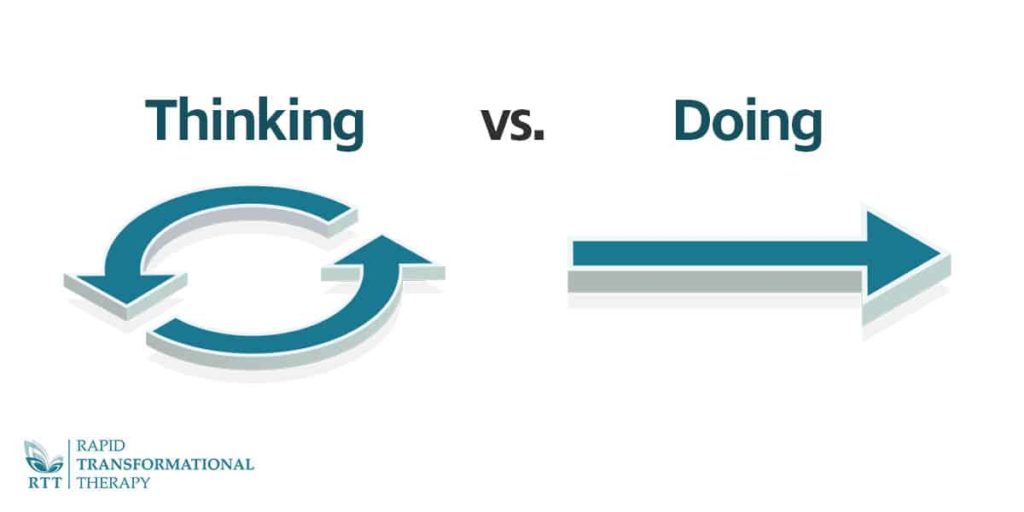You may want to learn how to stop overthinking if you often find yourself rehashing past conversations, dwelling on your choices, or getting trapped in a never-ending tunnel of “What if…?” scenarios. When you get stuck in a destructive cycle of worry or rumination, your mind has a tendency to turn against you. It starts to run rampant like a wild horse and you don’t know how to stop.
While everyone overthinks situations every once in a while, some people are assaulted by their overactive minds so often and with such intensity that they’re left crippled and unable to act. They overthink the problem until it feels much bigger than it actually is, drowning themselves in destructive thoughts until they feel completely hopeless.
Overthinking can be exhausting, but fortunately, there are tried and tested ways to get it completely under control.
In this article you will learn:
- What is overthinking and why it’s more dangerous than you think
- Why we tend to overthink things—the root cause of thinking too much
- Five simple ways to stop yourself from overthinking and finally start living
Let’s dive in by finding out why overthinking can be dangerous.
What is Overthinking?—Why It’s More Dangerous Than You Think

Overthinking, simply speaking, is when you uncontrollably think about something too much or for too long.
According to a study from the University of Michigan, 73% of adults between the ages of 25 and 35 overthink, as do 52% of 45 to 55-year-olds.
Even though overthinking may not seem like something harmful, it can have some serious psychological effects if it becomes a habit. Studies show that excess rumination and worry takes a toll on your mental and physical health by increasing your stress levels and causing anxiety.
The two types of overthinking
Overthinking can be broken down into two different types—ruminating about the past and worrying about the future.
Rumination
Ruminating is all about continual dwelling on some negative aspects of the past, wishing one could change it.
- “I shouldn’t have said those things to my boss yesterday. He probably thinks I’m an idiot.”
- “I should have never broken up with him. I would be happier than I am now.”
- “My parents didn’t teach me how to be confident. My insecurities have always held me back.”
The problem with ruminating is that it’s all about over-focusing on your past, which is something that’s ultimately outside of your control.
Worrying
Worrying, on the other hand, is future-focused.
It includes coming up with hypothetical worst-case scenarios, getting consumed by them, and having emotional reactions as if they were true.
- “I’m going to embarrass myself tomorrow when I give that presentation. My hands will shake, my face will turn red, and everyone will see that I’m incompetent.”
- “I’ll never get that promotion. It doesn’t matter what I do. It’s not going to happen.”
- “My spouse is going to find someone better than me. I’m going to end up divorced and alone.”
Just like rumination, you overemphasize future situations that are outside of your control.
Symptoms of Overthinking
Overthinking can affect your life in multiple ways. Explore some of the symptoms listed below and see which ones you can relate to:
- You are less likely to act: Overthinking makes you lose perspective of the big picture of things. Your mind introduces too many options that end up hindering your decisiveness. This phenomenon is often referred to as “analysis by paralysis.”
- You become less creative: Obsessing over stuff and cycling through the same thoughts over and over again can leave little to no room for new and creative ideas.
- Your judgment becomes clouded: Overthinking leads to increased stress levels and the production of the stress hormone cortisol. Continual release of cortisol keeps our bodies in a fight-or-flight mode, which over time impairs cognitive abilities and clouds your judgment.
- Your energy levels take a nosedive: It takes a lot of mental energy to overthink. Your mind is in overdrive, generating so many different thoughts that you get exhausted and burned out from spending so much time in your own head.
Why Do I Overthink Things?

Many people ask themselves, “Why do I overthink?” or, “Is overthinking a mental disorder?” The truth is, there are many possible explanations as to why you may find yourself overthinking things. It is important to understand these reasons in order to learn how to stop overthinking.
Here are the five most common reasons why overthinking occurs:
1. Fear of making a mistake
Did you grow up in an environment where only success was rewarded, and failure was severely punished?
You may have learned to fear making mistakes as a child. Today, this tendency could have translated into constant analyzing, second-guessing your decisions, and ruminating over your past actions.
2. Your environment
Do the people you surround yourself with display toxic and overly critical behavior? Do you feel that these people place undue expectations on you?
If your answer is “Yes,” you are likely to be run by the constant tension and anxiety to satisfy your peer’s expectations.
3. Need for control
Marisa Peer, Britain’s #1 voted therapist, says, “The role of control is that the only thing you can control is your thoughts.”
However, most people have a tendency to want to control events that are outside of their circle of influence.
They fret about everything from natural disasters to deadly diseases. Their worries keep them occupied, but ultimately, they waste their time and energy because worrying doesn’t do any good.
4. Overly caring about other people’s opinions
Do you attach your own sense of worth to how other people perceive you? If “Yes,” you may become increasingly preoccupied and worried about how you come across.
This could make you second guess yourself and over analyze every action you take.
“How are these pants going to make me look?”
“What would my colleagues think if I spoke out?”
“Are those people gossiping about me?”
If your mind is run by thoughts of this kind, you are depleting yourself of your own power by letting others dictate how you feel about yourself.
5. Mental habituation
If the cycle of worry and rumination is repeated enough times, it eventually forms into a habit. The more you do it, the harder it becomes for you to stop.
Sometimes people confuse overthinking with actual problem-solving.
As you might have noticed, however, worrying and rumination are not solving any actual problems. Rather it gets you stuck in a mental loop that prevents any tangible solutions from transpiring.
How Do I Stop Overthinking Things? Five Simple Ways to Get Out of the Worry and Rumination Cycle

Overthinking is not something you have to live with for the rest of your life.
It is simply a mental habit, and it can be broken.
Follow these five strategies to learn how to stop overthinking. Learn to respond to your overactive mind in a way that promotes clear, decisive, and confident action.
1. Practice mindfulness
One of the biggest problems with overthinking is that it sucks us into our thoughts and wreaks havoc on our emotions without our permission.
In fact, this habit can become so pervasive that it can hijack your mind without you even noticing. That’s why the first step in overcoming overthinking is practicing mindfulness.
To do this, start getting into the habit of paying attention to the content of your thoughts on a regular basis.
When you notice yourself replaying negative events from the past or over analyzing what might happen in the future, don’t judge yourself.
Instead, take a moment to simply notice and acknowledge that this is what you are doing in that moment.
Try it now:
- Become aware of your body and what is happening around you right now. Look around your room, what do you see? Scan each part of your body to see if there is any tension and allow yourself to let it go.
- Close your eyes, relax, and slow down your breathing. Inhale and exhale through your nostrils, paying attention to how your chest and stomach move as you breathe.
- Become aware of your thoughts and feelings. Don’t judge them, simply acknowledge that they are there and continue to breathe deeply. Allow yourself to simply observe those thoughts passing by as if you were looking at clouds in the sky.
Doing this exercise for one to two minutes every time you find yourself overthinking will help you build awareness over your mind and create space between you and your thoughts.
Becoming aware of your mind rather than identifying with the content thoughts is an absolutely crucial first step if you want to learn how to stop overthinking.
2. Challenge your thoughts

Now that you have gained awareness of your thoughts, and stopped identifying with them, you are in a position to question their validity. This is an important step in the process of learning how to stop overthinking.
Try asking yourself the following questions:
- Why do I think this is going to happen?
- Is it possible that my thinking is incorrect?
- Do I have any evidence to assume that what I’m thinking about is correct?
- What will be the impact of this decision in the future? What are its second-order consequences?
- Is it really as important as it seems? Will it matter one month from now? One year from now? Five years from now?
- Do I have a solution that I can put to action and see what happens?
- What are the other possible interpretations of this situation that I haven’t considered?
By asking yourself the right questions, you can guide your overactive mind towards solution-oriented action, rather than being stuck in the endless cycle of overthinking.
3. Put things into wider perspective
When you fall into the trap of overthinking, you narrow your perspective down to focus on a few details and lose touch with the big picture of things.
Over the last thirty years, working with clients from royalty and rockstars to CEOs and Olympic athletes, Marisa Peer concluded that, “Whatever you focus on, you get more of.”
When you have all of your mental energy invested in trying to solve hypothetical problems or analyze past mistakes, that is what you get more of: problems and mistakes.
Overthinking obscures your view of what’s actually important.
When you are narrow visioned you lack the ability to see what needs to get done in the present moment.
To regain perspective, allow yourself to step away from the problem and focus on something else for a period of time.
When you get back to the issue that was draining all of your mental energy, you will approach it with a fresh perspective that is not tainted by worry or rumination.
4. Take action

Often we overthinking because we are trying to attain a goal or resolve some kind of problem.
Some people believe that sifting through the same thoughts repeatedly may grant them access to additional insights, thereby deeming it a productive activity.
However, here is a sobering thought:
If you cut the time you spend overthinking in half and spent that time acting on what you are obsessively thinking about, how much further ahead do you think you’d be?
Answer honestly…
When all you do is spend time inside of your head trying to think out the solution, you discount the most important element: taking action.
Thinking without doing makes you stuck in your own mental feedback loops. To make those thoughts productive, infuse them with an element of action-taking and real-world feedback.
You may be thinking to yourself, “OK, wait, hold on for a minute! If I don’t give it proper consideration and time thinking through different scenarios, I might make mistakes.”
Yes, that’s true. Nonetheless, even when you are making mistakes, along the way, you will learn what works, what doesn’t, and how to do it better next time around.
Sometimes, decisive action is the best cure for an overactive mind.
5. Ask for help

Rapid Transformational Therapy® (RTT®)
Even though it may sometimes feel like no one cares, remember that you are not alone.
Asking for help when you are trying to learn how to stop overthinking allows you to surround yourself with people who can make you feel good and further facilitate your development. They can bring hope when you’re feeling hopeless and help you deal with challenging situations, which will improve your resilience.
Better yet, if the people you are asking for help from are experts in the exact issue you are dealing with, you just found a shortcut to resolving it.
Marisa Peer’s revolutionary Rapid Transformational Therapy® (RTT®) is making waves in the personal growth industry by providing astonishing results in as little as one to three sessions.
RTT® is a technique that combines different modes of psychotherapy with hypnotherapy, NLP, CBT, and neuroscience. As such, it is a remarkably effective and quick path towards psychological wellbeing.
Book a free consultation with one of our RTT therapists now. The RTT® Find a Specialist Therapist service helps you connect with a specialist who was trained by Marisa Peer.
Our RTT Therapists have the expertise to help, phenomenal skills, and outstanding levels of client satisfaction. They will guide you on your path towards mastering the power of your mind so you can become free from overthinking forever.
All it takes is one life-changing session to help you break free from overthinking, by addressing the root cause of your problems and fixing them once and for all.
Remember, there is nothing wrong with asking for help. This is how you bring your best self forward, ready to conquer life challenges faster than if you were to do it alone.
Join the 21-Day Unstoppable Confidence Challenge
Overthinking is a symptom of an over-active and anxious brain, which could be improved by investing in the development of your self-esteem and confidence. If you can build on your confidence, you can calm your mind and relieve your anxious thoughts, which means you will worry less, and relax more.
It may be daunting thinking about the need to improve your confidence without direction or help from others. That’s why Marisa Peer has designed her 21-Day Unstoppable Confidence Challenge for people just like you.
With three weeks of guided training, mediations and audios, you will learn everything you need to know to develop an unshakeable confidence from popular therapist Marisa Peer, as well as participate in a thriving community of those taking on the challenge with you. To find out more, click the banner below, and be sure to secure your spot for the next challenge!




